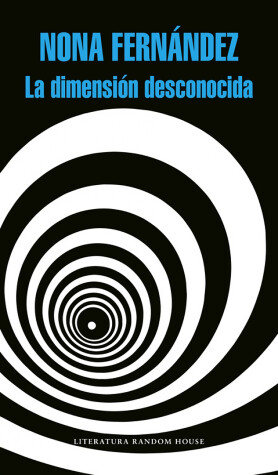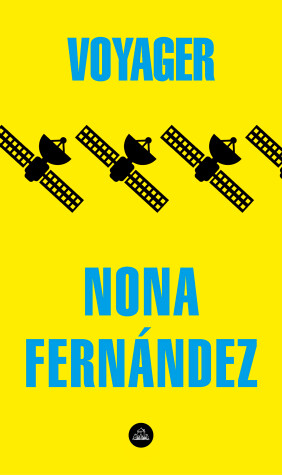Mapa de Las Lenguas
2 total works
Finalista de los mejores libros traducidos de los National Book Awards 2021
Las historias de La dimensión desconocida, dice la narradora, «siempre han estado pisándome los talones. Nací con ellas incorporadas en un álbum familiar que no elegí ni organicé».
Novela galardonada con el Premio Sor Juana Inés de la Cruz 2017.
En plena dictadura chilena, un angustiado hombre llega a las oficinas de una revista de oposición. Es un agente de la policía secreta. Quiero hablar, dice, y una periodista prende su grabadora para escuchar un testimonio que abrirá las puertas de una dimensión hasta entonces desconocida.
Siguiendo la hebra de esta escena real, Nona Fernández activa los mecanismos de la imaginación para acceder a aquellos rincones donde la memoria y los archivos no han podido llegar.
Confrontando su propia experiencia con los relatos del hombre que torturaba, la narradora entra en las vidas de los protagonistas de ese testimonio ominoso: la de un padre que es detenido en una micro mientras lleva a sus hijos al colegio y la de un niño que cambia de nombres y de vidas hasta ser testigo de una masacre, entre otras.
Nona Fernández construye un relato a partir de la mala conciencia de un personaje insondable, exponiendo e iluminando esa zona de locura y extravío que está mucho más cerca de lo que pensamos y que puede hacer de un ser humano una bestia. Una novela que cautiva, conmueve y remece.
ENGLISH DESCRIPTION
2021 National Book Awards Finalist for Translated Literature
An engrossing, incantatory novel about the legacy of historical crimes by the author of Space Invaders.
Winner of the 2017 Sor Juana Ines de la Cruz Prize.
In the middle of the Chilean dictatorship, a distraught man goes into the offices of an opposition magazine. He's a secret police agent. I want to speak, he says, and a journalist turns on her tape recorder to listen to a testimony that will open the doors of an, until then, unknown dimension.
Following the thread of this real-life event, Nona Fernandez activates her imagination to access those corners where memory and investigative files have not been able to reach.
Having to confront her own experiences with that of the torturer, the narrator enters the lives of the protagonists of that menacing testimony: that of a father detained in a bus while taking his children to school, and that of a child who must continue to change his name and make up different life stories until one day he witnesses a massacre, among others.
Nona Fernández builds a story based on the bad conscience of an unfathomable character, exposing and shining a light to that area of madness and loss that is much closer than we think, and that can turn a human being into a beast. A novel that captivates, moves you, and shakes you.
Las historias de La dimensión desconocida, dice la narradora, «siempre han estado pisándome los talones. Nací con ellas incorporadas en un álbum familiar que no elegí ni organicé».
Novela galardonada con el Premio Sor Juana Inés de la Cruz 2017.
En plena dictadura chilena, un angustiado hombre llega a las oficinas de una revista de oposición. Es un agente de la policía secreta. Quiero hablar, dice, y una periodista prende su grabadora para escuchar un testimonio que abrirá las puertas de una dimensión hasta entonces desconocida.
Siguiendo la hebra de esta escena real, Nona Fernández activa los mecanismos de la imaginación para acceder a aquellos rincones donde la memoria y los archivos no han podido llegar.
Confrontando su propia experiencia con los relatos del hombre que torturaba, la narradora entra en las vidas de los protagonistas de ese testimonio ominoso: la de un padre que es detenido en una micro mientras lleva a sus hijos al colegio y la de un niño que cambia de nombres y de vidas hasta ser testigo de una masacre, entre otras.
Nona Fernández construye un relato a partir de la mala conciencia de un personaje insondable, exponiendo e iluminando esa zona de locura y extravío que está mucho más cerca de lo que pensamos y que puede hacer de un ser humano una bestia. Una novela que cautiva, conmueve y remece.
ENGLISH DESCRIPTION
2021 National Book Awards Finalist for Translated Literature
An engrossing, incantatory novel about the legacy of historical crimes by the author of Space Invaders.
Winner of the 2017 Sor Juana Ines de la Cruz Prize.
In the middle of the Chilean dictatorship, a distraught man goes into the offices of an opposition magazine. He's a secret police agent. I want to speak, he says, and a journalist turns on her tape recorder to listen to a testimony that will open the doors of an, until then, unknown dimension.
Following the thread of this real-life event, Nona Fernandez activates her imagination to access those corners where memory and investigative files have not been able to reach.
Having to confront her own experiences with that of the torturer, the narrator enters the lives of the protagonists of that menacing testimony: that of a father detained in a bus while taking his children to school, and that of a child who must continue to change his name and make up different life stories until one day he witnesses a massacre, among others.
Nona Fernández builds a story based on the bad conscience of an unfathomable character, exposing and shining a light to that area of madness and loss that is much closer than we think, and that can turn a human being into a beast. A novel that captivates, moves you, and shakes you.
La memoria de las estrellas. La memoria de una madre. Y la de su hija. La memoria de un pueblo. Cómo recordamos. Por qué. Para qué. Un ensayo emocionante.
Acompañando a su madre en sus exámenes neurológicos, la narradora de este libro advierte que la actividad cerebral proyectada en el monitor tiene muchas similitudes con las imágenes astronómicas que conoce. A partir de esa constatación, Nona Fernández comienza en este, su primer ensayo, a escudriñar en los mecanismos de la memoria estelar y la humana.
Tomando nota de todo lo que lee, observa y piensa, al modo de las Voyager, esas sondas exploratorias del espacio, Fernández va vinculando ese registro a su propia historia y a la del país, planteando con inteligencia cuestiones que son de ahora y de siempre. Cómo recuerdan las estrellas y las personas son interrogantes que inevitablemente llevan a preguntarse cómo recuerdan los pueblos, y cómo olvidan, y Nona Fernández las aborda con la sagacidad y el ímpetu que caracterizan su obra.
ENGLISH DESCRIPTION
The stars’ memory. A mother’s memory. And that of her daughter. A nation’s memory. How we remember. Why. For what purpose. An emotional essay.
Accompanying her mother during her neurological exams, the narrator of this book notices that the brain activity projected on the monitor is very similar to the astronomical images with which she’s familiar. From that finding, Nona Fernández begins in this, her first essay, to scrutinize the mechanisms of stellar and human memory.
Taking note of everything she reads, observes and thinks, in the manner of Voyager, with these exploratory space probes, Fernández is linking that record to her own history and that of the country, intelligently raising issues that are relevant now and forever. How the stars remember and how people remember are questions that inevitably lead to wondering how nations remember, and how they forget, and Nona Fernández addresses them with the sagacity and momentum that characterize her work.
Acompañando a su madre en sus exámenes neurológicos, la narradora de este libro advierte que la actividad cerebral proyectada en el monitor tiene muchas similitudes con las imágenes astronómicas que conoce. A partir de esa constatación, Nona Fernández comienza en este, su primer ensayo, a escudriñar en los mecanismos de la memoria estelar y la humana.
Tomando nota de todo lo que lee, observa y piensa, al modo de las Voyager, esas sondas exploratorias del espacio, Fernández va vinculando ese registro a su propia historia y a la del país, planteando con inteligencia cuestiones que son de ahora y de siempre. Cómo recuerdan las estrellas y las personas son interrogantes que inevitablemente llevan a preguntarse cómo recuerdan los pueblos, y cómo olvidan, y Nona Fernández las aborda con la sagacidad y el ímpetu que caracterizan su obra.
ENGLISH DESCRIPTION
The stars’ memory. A mother’s memory. And that of her daughter. A nation’s memory. How we remember. Why. For what purpose. An emotional essay.
Accompanying her mother during her neurological exams, the narrator of this book notices that the brain activity projected on the monitor is very similar to the astronomical images with which she’s familiar. From that finding, Nona Fernández begins in this, her first essay, to scrutinize the mechanisms of stellar and human memory.
Taking note of everything she reads, observes and thinks, in the manner of Voyager, with these exploratory space probes, Fernández is linking that record to her own history and that of the country, intelligently raising issues that are relevant now and forever. How the stars remember and how people remember are questions that inevitably lead to wondering how nations remember, and how they forget, and Nona Fernández addresses them with the sagacity and momentum that characterize her work.

